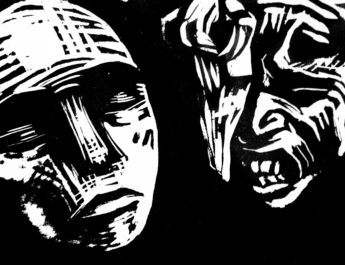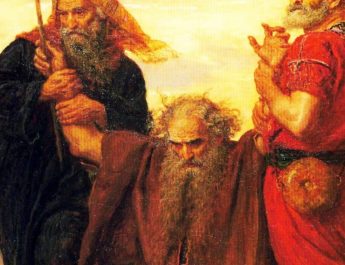Genesis 3
BibleHub
1 Now the serpentI wasII more craftyIII than any other wild animalIV
Notes on verse 1a
I “serpent” = nachash. Perhaps from nachash (to practice divination, learn by experience; to hiss as in whispering a spell). This is a serpent or snake. Used for the Serpent in the garden of Eden.
II “was” = hayah. This is to be or become, to happen.
III “crafty” = arum. 11x in OT. From arom (being shrewd or crafty, cunning; properly, being or making bare). This is crafty, shrew, or prudent. It is cunning, but usually in a negative way.
IV “wild animal” = chay + sadeh. Literally “living thing of the field.” Chay is from chayah (to live or keep alive literally or figuratively). This is alive, living, lifetime. It can also be used to describe someone’s age. It can refer to animals, plants, water, or a company or congregation of people. It is life in a very broad sense. Sadeh is literally field, ground, soil, or land. It is used to mean wild like a wild animal.
that the LordV GodVI had made.VII
Notes on verse 1b
V “Lord” = YHVH. Related to “was” in v1. From havah (to be, become) or hayah (see note II above). This is the name of the God of Israel, the self-existent and eternal one, the tetragrammaton. This pronunciation has been lost to time so “Lord” is generally used in its place.
VI “God” = Elohim.
VII “made” = asah. This is to make, do, act, appoint, become in many senses.
He said to the woman,VIII “Did God say, ‘You shall not eatIX from any treeX in the garden’?”XI
Notes on verse 1c
VIII “woman” = ishshah. From ish (man); perhaps from enosh (human, humankind, mortal); from anash (to be weak, sick, or frail). This is woman, wife, or female.
IX “eat” = akal. This is to eat, devour, burn up, or otherwise consume. It can be eating in a literal or figurative sense.
X “tree” = ets. Perhaps from atsah (to shut, fasten, firm up, to close one’s eyes). This is tree or other things related to trees like wood, sticks, or stalks. It can also refer to wood products like a plank or staff or gallows. Additionally, this can refer to a carpenter.
XI “garden” = gan. From ganan (to put a hedge around – generally, protect or defend; to cover or surround). This is a garden in that it is fenced in. It can also be an enclosure.
2 The woman said to the serpent, “We may eat of the fruitXII of the trees in the garden; 3 but God said, ‘You shall not eat of the fruit of the tree that is in the middleXIII of the garden, nor shall you touchXIV it, or you shall die.’”XV
Notes on verses 2-3
XII “fruit” = peri. From parah (to bear fruit, grow, be fruitful, increase; bearing fruit in a literal or figurative sense). This is fruit or reward.
XIII “middle” = tavek. This is among, middle, in the midst, the center. Perhaps, properly, to sever.
XIV “touch” = naga. This is touch, reach, arrive, come near, strike. This is touching for any reason including sexual or violent.
XV “die” = mut. This is to die in a literal or figurative sense. It can also refer to being a dead body.
4 But the serpent said to the woman, “You will not die;XVI 5 for God knowsXVII that whenXVIII you eat of it
Notes on verses 4-5a
XVI “die” = mut + mut. Same as “die” in v3. See note XVI above. The word is repeated twice – the first time as an Infinitive Absolute. The Infinitive Absolute serves to emphasize the sentiment of the word. It is rather like Foghorn Leghorn’s speech pattern, “I said, I said.”
XVII “knows” = yada. This is to know, acknowledge, advise, answer, be aware, be acquainted with. Properly, this is to figure something out by seeing. It includes ideas of observation, recognition, and care about something. It can be used causatively for instruction, designation, and punishment.
XVIII “when” = yom. Literally “in the day.”
your eyesXIX will be opened,XX and you will be like God, knowing goodXXI and evil.”XXII
Notes on verse 5b
XIX “eyes” = ayin. This is eye in a literal or figurative sense so eye, appearance, favor, or a fountain (the eye of the landscape).
XX “opened” = paqach. This is open, as opening one’s senses, particularly eyes. So, figuratively this can refer to being watchful.
XXI “good” = tob. From tob (to be pleasing, to be good). This is good, beautiful, pleasant, agreeable, bountiful, at ease. This word is used for goodness as a concept, a good thing, a good person. This can refer to prosperity and welfare as well as joy, kindness, sweetness, and graciousness. So, this is ethically good, but also enjoyably good.
XXII “evil” = ra’. From ra’a’ (to be evil, bad, afflict; properly, to spoil – to destroy by breaking into pieces; figuratively, to cause something to be worthless; this is bad in a physical, social, or moral sense; that which displeases, to do harm or mischief, to punish or vex). This is bad, disagreeable, that which causes pain, misery, something having little or no value, something that is ethically bad, wicked, injury, calamity. This refers to anything that is not what it ought to be – a natural disaster, a disfigurement, an injury, a sin.
6 So when the woman sawXXIII that the tree was good for food,XXIV and that it was a delightXXV to the eyes, and that the tree was to be desiredXXVI to make one wise,XXVII she took of its fruit and ate; and she also gave some to her husband,XXVIII who was with her, and he ate.
Notes on verse 6
XXIII “saw” = raah. This is to see in a literal or figurative sense so stare, advise, think, view.
XXIV “food” = maakal. Related to “eat” in v1. From akal (see note IX above). This is food, something edible.
XXV “delight” = taavah. From the same as avah (to desire, crave, wish for, lust after). This is what is desirable, a delight, greedy, satisfaction, a charm.
XXVI “desired” = chamad. This is to desire or delight in someone or something. It can also mean something that is precious or coveted. So, it can also refer to lust.
XXVII “make one wise” = sakal. This is to consider or be prudent and so it can mean to instruct or be an expert. It can also mean dealing prudently, which implies success and prospering. This verb presumes intelligence of the subject. In one form of the verb, it can mean laying cross-wise.
XXVIII “husband” = enosh. Related to “woman” in v1. See note VIII above.
7 Then the eyes of bothXXIX were opened, and they knew that they were naked;XXX and they sewed fig leavesXXXI togetherXXXII and made loinclothsXXXIII for themselves.
Notes on verse 7
XXIX “both” = shenayim. From sheni (double, again, another, second); from shanah (to fold, repeat, double, alter, or disguise). This is two, both, second, couple.
XXX “naked” = erom. Related to “crafty” in v1. 10x in OT. From ur (to be made naked, exposed, or bare) OR from arom (see note III above). This is nakedness or nudity.
XXXI “leaves” = aleh. 18x in OT. From alah (to go up, climb, to be high; to arise in a literal or figurative sense). This is leaf, branch, or foliage.
XXXII “sewed…together” = taphar. 4x in OT– including a time to sew in Ecclesiastes 3:7. This is to sew together or women who sew.
XXXIII “loincloths” = chagor. 7x in OT. From chagar (to gird, bind, or arm; using a belt to gather up one’s garment so that it’s easier to run or move quickly). This is a loincloth, belt, or armor.
8 They heardXXXIV the soundXXXV of the Lord God walkingXXXVI in the garden at the timeXXXVII of the evening breeze,XXXVIII
Notes on verse 8a
XXXIV “heard” = shama. This is to hear, call, consent, or consider. It implies listening intelligently, giving attention, and, because of these two factors, obedience and action are often implied.
XXXV “sound” = qol. This is a sound, used often for human voices. Also used when God speaks or angels, animals or instruments. It can be a cry or a noise, thunder or earthquakes and so on.
XXXVI “walking” = halak. This is go, come, walk. It is walk literally and figuratively and includes people and animals. It can be used figuratively for one’s moral life – how we walk according to God’s way or against it. It can also refer to the walk of life as in the course one’s life takes, the choices we make, etc.
XXXVII “time” = yom. Same as “when” in v5. See note XVIII above.
XXXVIII “breeze” = ruach. This is breath, wind, air, cool, spirit. This is wind, which resembles the breath and so this can be used figuratively for life itself or being frail/mortal/impermanent. It can refer to the air of the sky or the spirit.
and the manXXXIX and his wife hidXL themselves from the presenceXLI of the Lord God among the trees of the garden. 9 But the Lord God calledXLII to the man, and said to him, “Where are you?”
Notes on verses 8b-9
XXXIX “man” = adam. Perhaps from adam (to be red, make ruddy); related to adamah (ground, dirt, earth). This is man, humankind, also Adam’s name. It refers to a human individual or humanity.
XL “hid” = chaba. This is to hide, hush, harden (like water freezing), or secret.
XLI “presence” = paneh. From panah (to turn, face, appear). This is face in a literal or figurative sense. It could be face, presence, anger, respect. It can also be used of God to indicate divine favor or presence.
XLII “called” = qara. This is to call or call out – to call someone by name. Also used more broadly for calling forth.
10 He said, “I heard the sound of you in the garden, and I was afraid,XLIII because I was naked; and I hid myself.”
11 He said, “Who toldXLIV you that you were naked? Have you eaten from the tree of which I commandedXLV you not to eat?”
12 The man said, “The woman whom you gave to be with me, she gave me fruit from the tree, and I ate.”
13 Then the Lord God said to the woman, “What is this that you have done?”
The woman said, “The serpent trickedXLVI me, and I ate.”
Notes on verses 10-13
XLIII “was afraid” = yare. This is to fear, be afraid, dreadful. It can also refer to fearful reverence – to fear in a moral sense is to say to revere, respect.
XLIV “told” = nagad. This is to declare, make conspicuous, stand in front, manifest, predict, explain.
XLV “commanded” = tsavah. This is to charge, command, order, appoint, or enjoin. This is the root that the Hebrew word for “commandment” comes from (mitsvah).
XLVI “tricked” = nasha. 15x in OT. This is to deceive, lead astray, trick, or delude.
14 The Lord God said to the serpent,
“Because you have done this,
cursed are you among all animalsXLVII
and among all wild creatures;XLVIII
upon your bellyXLIX you shall go,L
Notes on verse 14a
XLVII “animals” = behemah. This is animal or cattle. It is often used of large quadrupeds.
XLVIII “wild creatures” = chay + sadeh. Same as “wild animal” in v1. See note IV above.
XLIX “belly” = gachon. 2x in OT. Perhaps from giyach (to break, gush like water, give birth). This is belly, used particularly for reptiles or other creatures.
L “go” = halak. Same as “walking” in v8. See note XXXVI above.
and dustLI you shall eat
all the daysLII of your life.LIII
Notes on verse 14b
LI “dust” = aphar. May be related to aphar (to throw dust, be dust). This is dust as powdered, perhaps gray colored. It could be ashes, powder, ground, dry earth, clay mud, or rubbish.
LII “days” = yom. Same as “when” in v8. See note XVIII above.
LIII “life” = chay. Same as “animal” in v1. See note IV above.
15 I will put enmityLIV between you and the woman,
and between your offspringLV and hers;LVI
he will strikeLVII your head,LVIII
and you will strike his heel.”LIX
Notes on verse 15
LIV “enmity” = ebah. 5x in OT. From ayab (to hate or be hostile to). This is hatred or hostility.
LV “offspring” = zera. From zara (to sow or scatter seed; conceive or yield). This is seed or sowing. It can, thus, mean a fruit, plant, sowing time, child, offspring, or posterity.
LVI “hers” = zera. Same as “offspring” in v15. See note LV above. Literally “her offspring.”
LVII “strike” = shuph. 4x in OT. This is to gape, bruise, overwhelm, snape at, or cover.
LVIII “head” = rosh. This may come a word that means to shake. It is the head, captain, or chief. It can also be excellent or the forefront. It can be first in position or in statue or in time (i.e. the beginning).
LIX “heel” = aqeb. 13x in OT. This is heel, hind part, hoof, rear guard of an army, one who lies in wait, or usurper.
16 To the woman he said,
“I will greatly increaseLX your pangsLXI in childbearing;LXII
Notes on verse 16a
LX “greatly increase” = rabah + rabah. This is increasing in any aspect whether quantity, authority, size, quality, greatness, etc. The word is repeated twice – the first time as an Infinitive Absolute. The Infinitive Absolute serves to emphasize the sentiment of the word. It is rather like Foghorn Leghorn’s speech pattern, “I said, I said.”
LXI “pangs” = itstsabon. 3x in OT – used of Eve’s curse of pangs in childbearing and of Adam’s curse of toil in his labor in Genesis 3; also in Genesis 5:29 of the relief that Noah will bring from the toil of humanity’s hands. From atsab (to hurt, grieve, displease; to carve, make, worry). This is pain, toil, or labor.
LXII “childbearing” = heron. 3x in OT. From harah (to conceive or be pregnant – can be literal or figurative). This is conception, being pregnant, or giving birth.
in painLXIII you shall bring forthLXIV children,LXV
Notes on verse 16b
LXIII “pain” = etseb. Related to “pangs” in v16. 7x in OT. From atsab (see note LXI above). This is a pain, sorrow, labor – it can be physical or mental pain. It can also refer to an idol.
LXIV “bring forth” = yalad. This is to bear or bring forth. It can mean to act as midwife or to show one’s lineage. This is often used for birth or begetting.
LXV “children” = ben. This is son, age, child. It is son in a literal or figurative sense.
yet your desireLXVI shall be for your husband,LXVII
and he shall ruleLXVIII over you.”
Notes on verse 16c
LXVI “desire” = teshuqah. 3x in OT – Eve’s curse that a woman’s desire will be for her husband in Genesis 3:16, God’s teaching to Cain that sin’s desire is for you, but you must master it in Genesis 4:7, & “I am my beloved’s and his desire is for me” from Song of Songs 7:10. Related to shuq (to overflow, run after). This is a longing or desire.
LXVII “husband” = ish. Related to “woman” in v1 & “husband” in v6. See note VIII above.
LXVIII “rule” = mashal. This is to rule, reign, govern, have authority, wield.
17 And to the manLXIX he said,
“Because you have listened to the voiceLXX of your wife,
and have eaten of the tree
about which I commanded you,
‘You shall not eat of it,’
cursed is the groundLXXI because of you;
in toilLXXII you shall eat of it all the days of your life;
Notes on verse 17
LXIX “man” = adam. Related to “man” in v8. 10x in OT. from the same as adam (see note XXXIX above). This is Adam.
LXX “voice” = qol. Same as “sound” in v8. See note XXXV above.
LXXI “ground” = adamah. Related to “man” in v8 & “man” in v17. From the same as adam (see note XXXIX above). This is ground, earth, soil as red, or land.
LXXII “toil” = itstsabon. Same as “pangs” in v16. See note LXI above.
18 thornsLXXIII and thistlesLXXIV it shall bring forthLXXV for you;
and you shall eat the plantsLXXVI of the field.LXXVII
Notes on verse 18
LXXIII “thorns” = qots. 12x in OT. Perhaps from quts (summer, clip off); from qayits (fruit, harvest, dry season). This is a thorn or thornbush.
LXXIV “thistles” = dardar. 2x in OT. From the same as deror (flowing quickly – hence flowing free, release, and liberty; pure or clear). This is a thistle or thorn.
LXXV “bring forth” = tsamach. This is to sprout, grow, or spring up – literal or figurative.
LXXVI “plants” = eseb. Root may mean to be green or to glisten. This is grass or some other tender shoot.
LXXVII “field” = sadeh. Same as “wild” in v1. See note IV above.
19 By the sweatLXXVIII of your faceLXXIX
you shall eat breadLXXX
until you returnLXXXI to the ground,
for out of it you were taken;
you are dust,
and to dust you shall return.”
Notes on verse 19
LXXVIII “sweat” = zeah. 1x in OT. From the same as yeza (to sweat, ooze; a thing that induces sweating like a sweating dress) OR from zuwa (to tremble, move, agitate, cause fear or anger). This is sweat.
LXXIX “face” = aph. From anaph (to be angry; properly, breathing hard as a signifier of being enraged). This properly refers to the nose or nostril and by extension the face. It can specifically refer to anger or wrath as one breathes hard and nostrils flare in times of great anger.
LXXX “bread” = lechem. From lacham (to eat, feed on). This is bread, food, loaf. It can refer to food more generally for people or for animals.
LXXXI “return” = shub. To turn back, return, turn away – literally or figuratively. Doesn’t necessarily imply going back to where you started from. This is also the root verb for the Hebrew word for repentance “teshubah.”
20 The man namedLXXXII his wife Eve,LXXXIII because she was the mother of all living. 21 And the Lord God made garmentsLXXXIV of skinsLXXXV for the man and for his wife, and clothedLXXXVI them.
Notes on verses 20-21
LXXXII “the man named” = qara + adam + shem. Literally “the man called the name.” Qara is the same as “called” in v9. See note XLII above. Adam is the same as “man” in v8. See note XXXIX above. Shem may be from sum (to put, place, set). This is name, fame, renown. A name was thought to indicate something essential about a person – something about their individuality. So, this word can also mean honor, authority, or character.
LXXXIII “Eve” = Chavvah. Perhaps from chavah (show, tell, live, declare). This is Eve, meaning “life-giver.”
LXXXIV “garments” = kethoneth. Root may mean to cover. This is a tunic, coat, or other kind of garment.
LXXXV “skins” = or. Related to “naked” in v7. Perhaps from ur (see note XXX above). This is skin, hide, or leather. It can also refer to a body.
LXXXVI “clothed” = labash. This is to wrap around, which implies clothing oneself or someone else. This is wrapping around in a literal or figurative way.
22 Then the Lord God said, “See,LXXXVII the man has become like oneLXXXVIII of us, knowing good and evil; and now, he might reach outLXXXIX his handXC and take also from the tree of life, and eat, and liveXCI forever”XCII—
Notes on verse 22
LXXXVII “see” = hen. This is a remark of surprise or excitement: lo! Behold! It can also mean if or though.
LXXXVIII “one” = echad. Perhaps from achad (to unify, continue on a path; figuratively, to gather one’s thoughts). This is the number one, first, united. It can also be alone, altogether, a certain, a few.
LXXXIX “reach out” = shalach. This is to send out, away, send for, forsake. It can also mean to divorce or set a slave free.
XC “hand” = yad. This is hand, ability, power. Hand in a literal sense, but also what one can do or the means by which one does it.
XCI “live” = chayay. 17x in OT. This is to live, save live, or revive.
XCII “forever” = olam. This is a long scope of time whether in the past (antiquity, ancient time) or in the future (eternal, everlasting).
23 therefore the Lord God sentXCIII him forth from the garden of Eden,XCIV to tillXCV the ground from which he was taken.
Notes on verse 23
XCIII “sent” = shalach. Same as “reach out” in v22. See note LXXXIX above.
XCIV “Eden” = Eden. 16x in OT. Perhaps from the same as eden (luxury, delight, pleasure); from adan (to luxuriate). This is the garden of Eden and also the name of a Levite.
XCV “till” = abad. This is to work, serve, or compel. It can describe any kind of work or service (including religious devotion). Also, till or cultivate. Used causatively, it can mean to enslave or keep in bondage.
24 He drove outXCVI the man; and at the eastXCVII of the garden of Eden he placedXCVIII the cherubim,XCIX
Notes on verse 24a
XCVI “drove out” = garash. This is to cast out or expel. It can be to exile someone or to divorce them.
XCVII “east” = qedem. Perhaps from qadam (to come in front or be in front; to meet, anticipate, confront, receive, or rise; sometimes to meet for help). This is front, formerly, before, east, eternal, everlasting, antiquity.
XCVIII “placed” = shakan. This is to settle down in the sense of residing somewhere or staying there permanently. It can mean abide or continue. “Mishkan,” taken from this verb, is the Hebrew word for the Tabernacle (as a place where God abided).
XCIX “cherubim” = kerub. Perhaps related to Akkadian (“to bless” or “one who blesses”). This is a cherub – perhaps a class of angels. See https://en.wiktionary.org/wiki/%D7%9B%D7%A8%D7%95%D7%91#Hebrew
and a swordC flamingCI and turningCII to guardCIII the wayCIV to the tree of life.
Notes on verse 24b
C “sword” = chereb. From charab (to attack, slay). This is any sharp instrument like a sword, dagger, axe, or mattock.
CI “flaming” = lahat. 2x in OT – of the cherubim’s flaming sword in Genesis 3:24 & the secret arts performed by Pharaoh’s sorcerers in Exodus 7:11. From lahat (to burn, kindle, consume, lick up, blaze). This is flaming, blaze, enchantment.
CII “turning” = haphak. This is to turn, overturn, change, return, turn over, pervert.
CIII “guard” = shamar. This is to keep, watch, or preserve. It means to guard something or to protect it as a thorny hedge protects something.
CIV “way” = derek. From darak (to tread, march, to walk. Can also mean affixing a string to a box since one needs to step on it to bend it in the process; so also an archer). This is a road as a thing that is walked on. Can be used figuratively for the path that one’s life takes or how one chooses to live one’s life.
Image credit: “The Expulsion from Eden” by John Roddam Spencer Stanhope, 1900.




